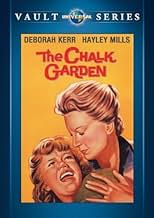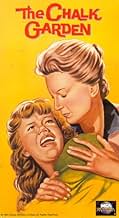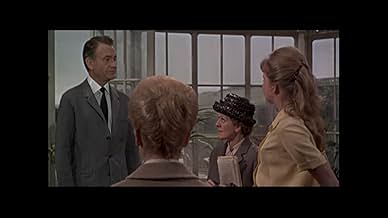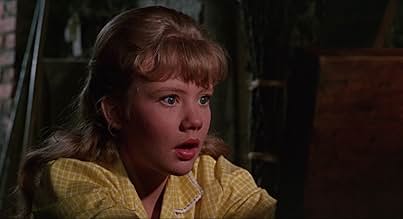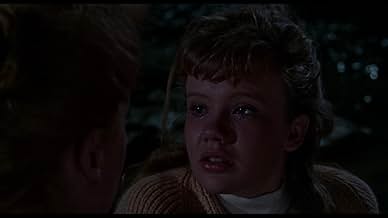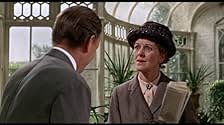An elderly woman hires a governess with a mysterious past to look after her disturbed, spoiled teenage granddaughter, who eventually understands the meaning of self-sacrifice as an example o... Read allAn elderly woman hires a governess with a mysterious past to look after her disturbed, spoiled teenage granddaughter, who eventually understands the meaning of self-sacrifice as an example of love and grows into a better person.An elderly woman hires a governess with a mysterious past to look after her disturbed, spoiled teenage granddaughter, who eventually understands the meaning of self-sacrifice as an example of love and grows into a better person.
- Nominated for 1 Oscar
- 3 wins & 6 nominations total
- Director
- Writers
- All cast & crew
- Production, box office & more at IMDbPro
Featured reviews
The story is set in an old manor house in Sussex. (The house used is a real one, in the village of East Dean on the South Downs near Eastbourne). A mysterious woman calling herself Miss Madrigal arrives at the house to be interviewed for the position of governess to Laurel, the teenage granddaughter of the owner, Mrs. St Maugham. Although Miss Madrigal has no references and no previous experience as a governess, she gets the position, largely because Laurel is such a badly-behaved child that none of the other candidates can bear the thought of looking after her.
This is, however, no comedy about an amusingly naughty girl. It soon becomes clear that Laurel's behaviour is far more than childish mischief or teenage rebellion, and that she is in fact a deeply unhappy and disturbed young woman. She seems to be preoccupied with crime, especially murder and arson, and the roots of her unhappiness appear to lie in her upbringing. Her father is dead and her mother abandoned her when she married for a second time, leaving the girl to be brought up by her imperious and eccentric grandmother, who has neglected her. Laurel's mother Olivia, however, has now reappeared and is intent on reclaiming custody of her daughter, a prospect Mrs. St Maugham views with abhorrence as she regards Olivia as an unfit mother.
The title "The Chalk Garden" refers on a literal level to the alkaline chalky soil in Mrs. St Maugham's garden, an unsuitable medium for growing the sort of flowers which the old lady is trying to plant, especially rhododendrons which need acid soil. (In other parts of Sussex they grow like weeds). Metaphorically, it is used to suggest that Laurel, symbolically named after a plant, has also been raised in the wrong type of environment.
The film was directed by Ronald Neame who was also responsible for "The Prime of Miss Jean Brodie". In both films he makes symbolic use of colour. Here the predominant colours are green (representing the "garden" element of the title) and white (representing "chalk"). The green of the vegetation predominates in the outdoor scenes, white in the indoor ones, and many scenes feature a prominent white object- a nightdress, a glass of milk, the cliffs of Beachy Head or the Seven Sisters. Symbolically, green can be seen as symbolising youth and growth, white with innocence but also with aridity and sterility. Other colours are associated with particular characters who are often seen dressed in them- yellow with Laurel, blue with Miss Madrigal, purple (the colour of both royalty and mourning) with Mrs. St Maugham, who is both imperious and unhappy. The bright reds, pinks and oranges which played an important part in "Jean Brodie" are not much used.
As in "Jean Brodie", Neame elicits some fine performances from his stars, especially the women. (In both films the female roles are more prominent than the male ones). Apart from three silent movies in the 1910s, Edith Evans was an actress who came late to the cinema, not making her first "talkie" until she was in her sixties, but quickly carved out a niche playing haughty upper-class ladies, most famously Lady Bracknell in "The Importance of Being Earnest". Here, as Mrs St Maugham, she shows that she could play this sort of role in serious drama as well as comedy. Deborah Kerr, as Madrigal, is suitably mysterious and inscrutable in the early scenes, more passionate in the later ones after the secret of her past (I won't say what it is) has been revealed. There is also a good contribution from Hayley's father John as the butler Maitland (who may also hide a secret of his own). John Mills also acted with his daughter in three other films, including "Tiger Bay".
Hayley Mills is brilliant as the disturbed, unhappy Laurel, one of her best roles and a more challenging one even than Gillie in "Tiger Bay" or Cathy in "Whistle Down the Wind". Seeing this film made me all the more surprised that she did not go on to become a bigger star as an adult. This is one of a number of films in which Hayley plays a child or teenager growing up in something other than the traditional two-parent family- in "Whistle Down the Wind" she is being raised by her widowed father, in "Tiger Bay" and "Pollyanna" she is an orphan and in "The Parent Trap" she plays twin sisters whose parents are divorced.
I would not rate this film quite as highly as "Tiger Bay", "Whistle Down the Wind", or "Jean Brodie", three of the classics of the British cinema. The plot, based upon a play by Enid Bagnold, can seem a bit too neat and schematic when the secret of the mysterious Miss Madrigal's own past is finally revealed, and there is some rather trite moralising. Nevertheless, it is a well-acted and well-photographed piece of film-making, and I am surprised that it is not better known. 7/10
This is a lovely combination of real-life father, John Mills, in a fine supporting role, and Deborah Kerr as the well-meaning but beleaguered governess. Many scenes are emotionally intense yet so well acted that we are swept along in the story. The tangled threads of family relationships is gradually sorted out and priorities are set aright after much confusion and willfulness particularly in the obstinacy of the grandmother (Edith Evans), who performs with great dramatic vehemence near the conclusion. A touching, human story, a great play.
This movie has drama, suspense, surprises, great characters and is so well acted. John Mills, Haley's father, is so subtle in his role as Maitland. Dame Edith Evans, as the child's over indulgent grandmother is superb. Haley Mills is delightful as the teenager just trying to yell at the world "Look at me, I matter". And Deborah Kerr, who is among my favorite actors, gives as always a subtle, striking performance. She makes me wish I had a governess, and it was her. I am 55 and I saw this film many, many years ago as a kid, and have always loved it. My mom and I used to watch it all time when it showed up on TV. I would periodically check out Netflix to see if was available to rent, also checked out Amazon to buy. Could never get it on either one. (Still can't find it on Netflix). I decided a few weeks ago to try Amazon again, and there it was to my pleasant surprise. Now I can pass on this treasure to my nieces. I just hope they love it as much as I. As I said it is a small movie w/a great message: Children need to be heard and listen to, but also loved and given boundaries. And all people big and small, just want to be valued.
It seems they don't make simple straightforward drama delivered as stylish as the Ross Hunter Productions did. 'Straightforward' in the sense of no gimmick, no special effects - just simply excellent performances all round - a handful of characters weaving a meaningful, intriguing story. A believable set design and complementing art direction, skillful cinematography and right dose of music score applied. Directed by Ronald Naeme (who gave us "The Prime of Miss Jean Brodie" 1969 and blockbuster disaster hit "The Poseidon Adventure" circa 1972), you can say it's a perfect film experience, in spite of the 'damaged' teenager fighting for love and self-esteem subject. It was wonderful to see this film all over again, twice, thrice - well, there's no chapters option, the DVD simply plays and loops itself. (Hence the 'Vault Series' with no fanfare.) Guarantee deeper appreciation of this production and the performances with repeat viewing.
I'm sure I'm not the only one who very much misses the other gem of a movie with Hayley Mills acting with her father John Mills again in the 1965 "The Truth About Spring" (directed by Richard Thorpe), a fun romp and buoyantly merry (sea adventure) with James MacArthur as Spring's (Hayley's character) opposite attraction. Sure hope a DVD revival version will soon sprout up! It IS a Universal Pictures - both production and distribution!
Note: Notice Ronald Naeme was born in 1911. He'd be 100 next year in 2011. What an illustrious cinematic life in film-making achievements, and having been with the masters, Alfred Hitchcock and David Lean.
The movie is set on the steep chalky-white cliffs of Southern England where an elderly lady, Mrs. St. Maugham (Edith Evans), lives with her 16-year-old granddaughter, Laurel (Hayley Mills), after Laurel's mother had divorced her father and the father died. Mrs. St. Maugham is in the process of hiring a new governess, Miss Madrigal (Deborah Kerr), while fighting with her daughter, Olivia (Elizabeth Sellars), over legal custody of Laurel. In spite of giving no references, Miss Madrigal totally wins over Mrs. St. Maugham and is hired as Laurel's governess.
The situation that Miss Madrigal walks into is very unconventional. The butler, Maitland (John Mills), is formal but far from non-observant or cold. Laurel is a cold-blooded, obnoxious brat who seems to have control of everyone around her and is tolerated, if not encouraged, for her precocious snobbishness. She enjoys shocking people and has Miss Madrigal in her sights as the next victim in a long line of governesses unable to control her. But, Madrigal is no pushover, and Laurel has her work cut out for her before getting rid of THIS governess.
As the movie progresses, there is sort of a back-and-forth psychological game between Laurel's attempt to unearth something about Madrigal's past (so that she can get rid of her) and Madrigal's trying to learn more about Laurel's problems so she can help her. Laurel tries to play private detective by looking for incriminating evidence against Miss Madrigal. She notices that all of Madrigal's clothes (and her luggage) are new; that she has no visitors or phone calls; that she never writes or receives letters; and that she has no family photos to place on her dressing table. Laurel also notices that Miss Madrigal never locks her door for privacy until Maitland suggests it and buys a good padlock for her. Laurel's curiosity gets the best of her, and she breaks into Miss Madrigal's room to try to find something on her. But she fails.
One evening in a conversation with Maitland, Miss Madrigal learns--or should I say confirms--that Laurel is a habitual liar: she learns this as she checks out several things that Laurel had told her. This seems to be troubling to her since she sees some of her own past in Laurel— something that shows Laurel's need to be loved and manifests this need by controlling people—keeping them away.
Things come to a head when Mrs. St. Maugham's 'former mistress,' Judge McWhirrey, 'puppy' (Felix Aylmer), comes to visit the house before judging a murder case in London. While at the super table, Laurel, fascinated by true crime cases, asks him to describe, in detail, what a murder case is like. Real criminal cases are a passion that she and Maitland enjoy sharing. Judge McWhirrey's description is very upsetting to Miss Madrigal and eventually leads to the final outcome of the movie.
While watching this movie, it is very easy to forget that John and Hayley Mills were a real-life father and daughter team. John puts up with Hayley's spoiled child role. At times, Hayley seems like she is overplaying her role, as she might have in a Disney movie, but there can be nothing subtle about Laurel, and she can't be played subtlety. In fact, she plays a child trying to pretend that she is an adult. The child side of her is captured in a couple scenes where she thinks she is not being watched: one with a childhood doll and another where she builds a sandcastle on the beach only to kick it over angrily when Miss Madrigal comes along to admire it. The scene on the steps (near the end of the movie) where Maitland and Laurel confront each other is powerful stuff and deserves nothing but kudos from the father-daughter acting duo. Overall, this is a good movie that deserves to be restored on DVD so that it can reach a wider audience.
Did you know
- TriviaGladys Cooper was originally named to play the role of Mrs. St. Maugham (which was eventually played by Dame Edith Evans). Evans, who had originally played the role on stage, very much wanted the movie role and had director Ronald Neame take her to meet producer Ross Hunter at Claridges Hotel. As Evans won the producer over, she got the part.
- GoofsThe wall clock in the kitchen where Laurel, Miss Madrigal, and Maitland discuss the judge's visit changes from 9:30 to 6:30 between shots.
- Quotes
[last lines]
Mrs. St. Maugham: [on the verge of tears] Is it a crime to want to be remembered?
Miss Madrigal: No. The Pharaohs built the pyramids for that reason.
Mrs. St. Maugham: What do women do in my case?
Miss Madrigal: It wouldn't hurt to go on gardening.
Mrs. St. Maugham: Have I've a muddle of my garden... and my heart? Will Olivia forgive me?
Miss Madrigal: In time, perhaps.
Mrs. St. Maugham: Would you stay with me? Would you?
Miss Madrigal: I'll stay... as long as I'm wanted. You know, we could make this place so full of life - a good life - and people would come from everywhere to see us. What do you think?
Mrs. St. Maugham: I must know one thing.
Miss Madrigal: What's that?
Mrs. St. Maugham: Did you do it?
Miss Madrigal: What many learned men at the top of their profession couldn't find out after a long, long trial. Why should you know.
Mrs. St. Maugham: Forty years ago, I should have said the same thing, but I warn you, before I die, I'll find out.
[the two walk off together]
- ConnectionsReferenced in What's My Line?: Louis Armstrong (2) (1964)
- How long is The Chalk Garden?Powered by Alexa
Details
- Release date
- Countries of origin
- Language
- Also known as
- The Chalk Garden
- Filming locations
- Clapham House, Clapham Lane, Litlington, East Sussex, UK(House exteriors and garden)
- Production companies
- See more company credits at IMDbPro
- Runtime
- 1h 46m(106 min)
- Color
- Aspect ratio
- 1.85 : 1


